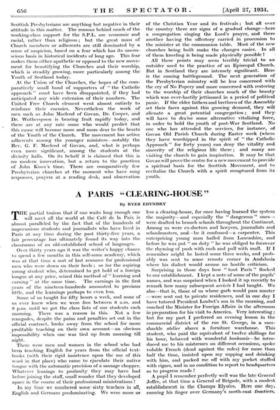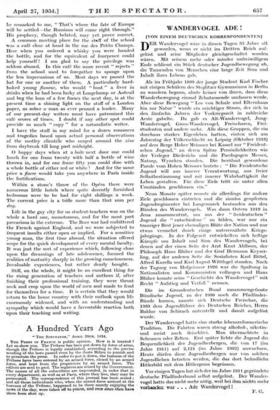A PARIS " CLEARENG-HOUSE "
By RYES EDYNBRY
THE partial truism that if one waits long enough one will meet all the world at the Café de la Paix is almost paralleled by the fact that of the hundreds of impecunious students and journalists who have lived in Paris at any time during the past thirty-five years, a fair percentage has ultimately found its way into the classrooms of an old-established school of languages.
Over thirty years ago it was the writer's happy chance to spend a few months in this self-same academy, which was at that time a sort of last resource for professional men who were down on their heels ; or for the aspiring young student who, determined to get hold of a foreign tongue at any price, seized this method of " learning and earning " at the same time. The earnings in the first years of the nineteen-hundreds amounted to precious little, and the lcarnings perhaps to even less.
Some of us taught for fifty hours a week, and none of us ever knew when we were free between 8 a.m. and 9 p.m. until we got the class lists of our students each morning. There was a reason in this. Not a few renegades, despite the pains and penalties set out in the official contract, broke away from the school for more profitable teaching on their own account—an obvious . impossibility when one was tied up from morning till night.
There were men and women in the school who had been teaching English for years from the official text- books (with their rigid insistence upon the use of this word in that place) who came to ejaculate their . native tongue with the automatic precision of a sausage chopper. Whatever leanings to profanity they may have had before joining the staff, small wonder that they developed apace in the course of their professional ministrations !
In my time we numbered some sixty teachers in all, English and Germans predominating. We were more or less a clearing-house, for once having learned the system the majority—and especially the " dangerous " ones— were drafted to branch schools throughout the Continent. Among us were ex-doctors and lawyers, journalists and schoolmasters, and—be it confessed—a carpenter. This enterprising young man hailed from Lancashire, and before he was put " on duty " he was obliged to forswear the rhyming of push with rush and pull with mull. If I remember aright he lasted some three weeks, and prob- ably was sent to some remote corner in Andalusia where his dialect would arouse no hostile criticism.
Surprising in those days how " tout Paris " flocked to our establishment. I kept a note of some of the pupils' names, and was surprised when I looked it up recently to remark how many subsequent arrives I had taught. We also—that is, those of us whose garb would pass muster —were sent out to private residences, and in one day I have tutored President Loubct's son in the morning, and coached the Minister for Foreign Affairs in the afternoon in preparation for his visit to America. Very interesting ; but for my part I preferred an evening lesson in the commercial district of the rue St. George, in a ram- shackle atelier above a furniture warehouse. This student, who paid the equivalent of twelve shillings for his hour, behaved with wonderful bonhomie—he intro- duced me to his mistresses on different occasions, spoke voluble French (dead against the rules) • for more than half the time, insisted upon my supping and drinking with him, and packed me off with my pocket stuffed with cigars, and in no condition to report to headquarters as to progress made !
A pupil I remember perfectly well was the late General Joffre, at that time a General of Brigade, with a modest establishment in the Champs Elys&s. Here one day, running his finger over Germany's north-east •frontiers, he remarked to me, " That's where the fate of Europe will be settled—the Russians will come right through." His prophecy, though belated, may yet prove correct.
A common meeting place for the staff of the school was a café close at hand in the rue des Petits Champs. Here when you ordered a whisky you were handed the bottle, and for the equivalent of fourpence could help -yourself ! I am glad to say the privilege was seldom abused. In this café the more recent " rejects " from the school used to foregather to sponge upon the less impecunious of us. Most days we passed the hat for one or another of them. A particularly hard- baked young jianeur, who would " bust " a fiver in drinks when he had been lucky at Longchamp or Auteuil and beg the loan of a few francs the next day, is at the present time a shining light on the staff of a London paper, as sober a• man as ever penned a leader. Many of our present-day writers must have patronized this café scores of times. I doubt if any other spot could provide so much " copy " for a naturalistic writer.
I have the stuff in my mind for a dozen romances and tragedies based upon actual personal observations of the motley clientele who surged around the zinc from daybreak till long past midnight.
0 happy days when at a boite next door one could lunch for one franc twenty with half a bottle of wine thrown in, and for one franc fifty you could dine with a whole bottle of either red or white ! And for the same price a fiacre would take you anywhere in Paris inside the fortifications.
Within a stone's throw of the Opera there were numerous little hotels where quite decently furnished bedrooms were to be had for eight shillings a week. The current price is a trifle more than that sum per day.
Life in the gay city for us student-teachers was on the whole a hard one, monotonous, and for the most part precarious in the extreme. The Boer war had embittered the French against England, and we were subjected to frequent insults either open or implied. For a sensitive young man, the first time abroad, the situation offered scope for the quick development of every mental faculty. It was just the sort of experience which, following close upon the dreamings of late adolescence, focused the realities of maturity sharply in the growing consciousness. Invaluable experiences, but rather dearly bought.
Still, on the whole, it might be an excellent thing for the rising generation of teachers and authors if, after finishing their professional training, they were thrust neck and crop upon the world of men and made to fend for themselves for a time. It is certain that they would return to the home country with their outlook upoti life enormously widened, and with an understanding and sympathy which would have a favourable reaction both upon their teaching and writing.













































 Previous page
Previous page